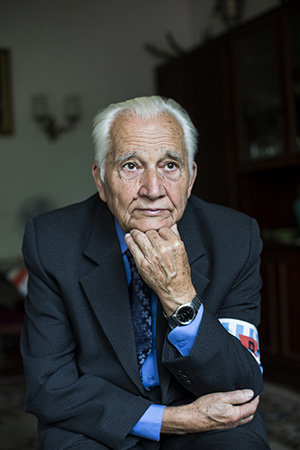
Photo by Andrzej Banaś
The Polish
government
has to fight
against Holocaust
denial.
To show the world
how many people
died at the hands
of the Germans
Play Broadcast 1
Play Broadcast 2
He has lost count of how many times he was tortured by the SS. Within the span of a few months, he went through the hell of three different concentration camps. The Germans told us that the only way out for us was through the chimney stacks of their crematoria, says Julian Wieciech, a Home Army soldier and survivor of the KZ Gross-Rosen and KZ Bergen-Belsen camps.
Julian Wieciech was arrested in his family home in the village of Lipnica Dolna on the morning of Sunday 29 October 1944. He was only 17 years old at the time. He was only 17 years old at the time. He was taken away to the prison in Bochnia for interrogation. Brutally beaten and repeatedly kicked, he tried to persuade his captors that his name was Kwiecień and that he worked as a farmhand at the Wieciech family estate. Ensign Julian Wieciech – pseudonym Skrzat (Dwarf) – made his name by taking part in a spectacular operation carried out in the Nowy Wiśnicz jail to rescue 128 political prisoners who had been consigned to Auschwitz for extermination.However, he continued trying to convince the Germans that he did not know the Home Army existed. His desperate attempts were unsuccessful. At the beginning of December 1944, Julian Wieciech entered KZ Gross-Rosen through the gate inscribed with the slogan Arbeit macht frei (Work sets you free).
The inmates were tortured on a daily basis. They might be killed for no reason at all. I remember one day someone deliberately stepped on our block leader’s cat. The inmates told him it was me. The block leader went berserk. He began punching and kicking me, and when I fell to the floor, he trampled on me. He was sure I was dead and he had my body taken away to a shed, says Julian Wieciech. He would not have survived had it not been for some inmates who saw he was still breathing.
The hardship of the camps, even at its worst, would never break Julian Wieciech. He remained loyal to the Home Army ethic and refused to collaborate with the Germans. When the SS told him to beat a praying priest, he had no qualms about saying no. He was whipped severely in return. The priest shouted at me: “Hit me, God will forgive you. Hit me or they’re going to kill you.” I just couldn’t do it, he says.
On 8 February 1945, KZ Gross-Rosen was evacuated. Julian Wieciech was transferred to KZ Mittelbau-Dora, and after several weeks he was moved to KZ Bergen-Belsen. He was one of the lucky few who survived the many days’ journey in packed trains, without sufficient water or food supplies. The camp was his final destination.
Every day at KZ Bergen-Belsen was a struggle for survival. On 15 April 1945, a car entered the camp, driven by a British officer who told the inmates in seven different languages that they were free, Julian Wieciech was barely alive. His emaciated body weighed only 36 kg. The doctors gave him ten minutes to live.
The Polish government has to fight against Holocaust denial. To show the world how many people died at the hands of the Germans, says Julian Wieciech emphatically.



